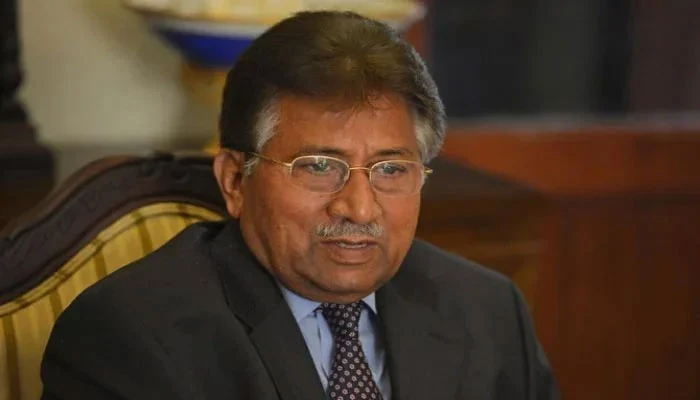‘Consequences of Musharraf’s conviction by special court to continue’
In exclusive talk with scribe, Musharraf’s lawyer says when convict dies, sentence awarded to them gets abated, matter considered closed
ISLAMABAD: Although the Supreme Court has abated the death penalty awarded by a special court to former president and army chief General (retd) Pervez Musharraf under Section 431 of the Code of Criminal Procedure because of his death, there will be some consequences, including restrictions on using the title of “General” with his name, revocation of military honours, confiscation of his properties, bank balances and vehicles, and cessation of pensions and other allowances to his heirs.
In an exclusive talk with the scribe on this matter, Musharraf’s lawyer Salman Safdar said that when a convict dies, the sentence awarded to them gets abated, and the matter is considered closed. However, applicants Chaudhry Taufiq Asif Advocate and Colonel (retd) Inamur Rahim Advocate asserted that since a convict cannot be hanged after their death, their capital punishment is declared abated to the extent of implementation.
They added that the conviction under the Constitution’s Article 6 entails that the title of General should not be used with the convict’s name at the official level, his images from government buildings must be removed and all assets under his name, including bank balances, properties, and vehicles, should be rightfully seized by the government. They added that his heirs should be fully relieved of pensions and all other benefits obtained during his service, and all honours granted to him during that time should be deemed null and void while he will be considered a certified national criminal instead of an accused.
It should be remembered that the late Peshawar High Court judge, Justice Waqar Ahmad Seth of the special court for high treason, had convicted Musharraf of high treason and sentenced him to death five times, and in case of death, his body was to be dragged to D Chowk, Islamabad, to be hanged.
However, Justice Shahid Karim of the Lahore High Court disagreed by declaring the extent of this act as un-Islamic, and issued a joint majority decision of one death penalty, while Justice Nazar Akbar of the Sindh High Court acquitted him in his minority judgment, and declared that no case of high treason could be made out against him.
It should be remembered that Musharraf’s lawyer Salman Safdar had not only challenged the death sentence in the Supreme Court but also through a constitutional petition challenged in the Lahore High Court the very forming of the special court for high treason, where Justice Mazahar Ali Akbar Naqvi (who resigned from the SC on Wednesday), Justice Ameer Hussain and Justice Chaudhry Sarwar, while approving the petition, declared that the formation of the special court was wrong, and that the federal government’s approval was not taken for it, while the case of Article 6 of the constitution against Pervez Musharraf could not be made out.
The irony is that on the one hand Musharraf has become a national criminal, while on the other hand, the distinguished judge Mazahar Ali Akbar Naqvi has resigned from his post after being disgusted with the proceedings of the Supreme Judicial Council against him over allegations of abuse of power and owning more assets than disclosed, and the audio leaks scandal.
-
 Pal Reveals Prince William’s ‘disorienting’ Turmoil Over Kate’s Cancer: ‘You Saw In His Eyes & The Way He Held Himself’
Pal Reveals Prince William’s ‘disorienting’ Turmoil Over Kate’s Cancer: ‘You Saw In His Eyes & The Way He Held Himself’ -
 Poll Reveals Majority Of Americans' Views On Bad Bunny
Poll Reveals Majority Of Americans' Views On Bad Bunny -
 Wiz Khalifa Thanks Aimee Aguilar For 'supporting Though Worst' After Dad's Death
Wiz Khalifa Thanks Aimee Aguilar For 'supporting Though Worst' After Dad's Death -
 Man Convicted After DNA Links Him To 20-year-old Rape Case
Man Convicted After DNA Links Him To 20-year-old Rape Case -
 Royal Expert Shares Update In Kate Middleton's Relationship With Princess Eugenie, Beatrice
Royal Expert Shares Update In Kate Middleton's Relationship With Princess Eugenie, Beatrice -
 Andrew Mountbatten-Windsor’s Leaves King Charles With No Choice: ‘Its’ Not Business As Usual’
Andrew Mountbatten-Windsor’s Leaves King Charles With No Choice: ‘Its’ Not Business As Usual’ -
 Dua Lipa Wishes Her 'always And Forever' Callum Turner Happy Birthday
Dua Lipa Wishes Her 'always And Forever' Callum Turner Happy Birthday -
 Police Dressed As Money Heist, Captain America Raid Mobile Theft At Carnival
Police Dressed As Money Heist, Captain America Raid Mobile Theft At Carnival -
 Winter Olympics 2026: Top Contenders Poised To Win Gold In Women’s Figure Skating
Winter Olympics 2026: Top Contenders Poised To Win Gold In Women’s Figure Skating -
 Inside The Moment King Charles Put Prince William In His Place For Speaking Against Andrew
Inside The Moment King Charles Put Prince William In His Place For Speaking Against Andrew -
 Will AI Take Your Job After Graduation? Here’s What Research Really Says
Will AI Take Your Job After Graduation? Here’s What Research Really Says -
 California Cop Accused Of Using Bogus 911 Calls To Reach Ex-partner
California Cop Accused Of Using Bogus 911 Calls To Reach Ex-partner -
 AI Film School Trains Hollywood's Next Generation Of Filmmakers
AI Film School Trains Hollywood's Next Generation Of Filmmakers -
 Royal Expert Claims Meghan Markle Is 'running Out Of Friends'
Royal Expert Claims Meghan Markle Is 'running Out Of Friends' -
 Bruno Mars' Valentine's Day Surprise Labelled 'classy Promo Move'
Bruno Mars' Valentine's Day Surprise Labelled 'classy Promo Move' -
 Ed Sheeran Shares His Trick Of Turning Bad Memories Into Happy Ones
Ed Sheeran Shares His Trick Of Turning Bad Memories Into Happy Ones




